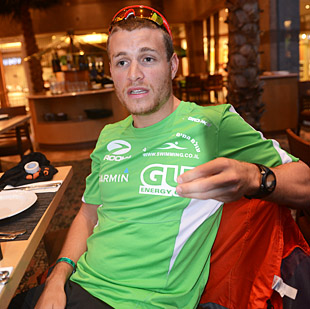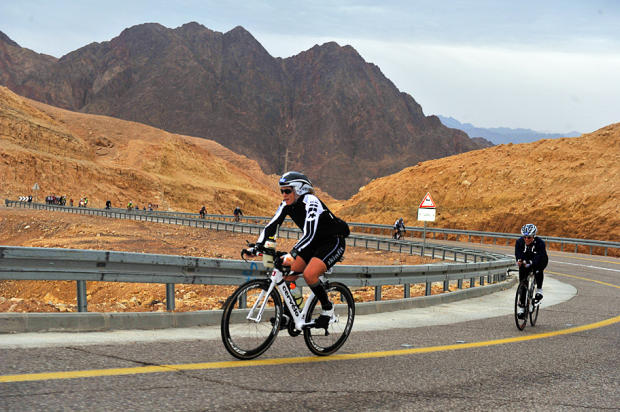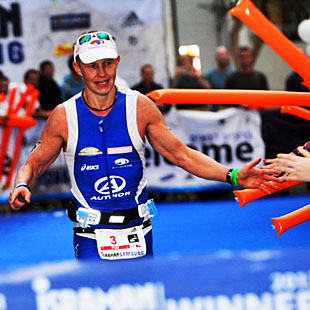Israel’s rising pro Ironwoman
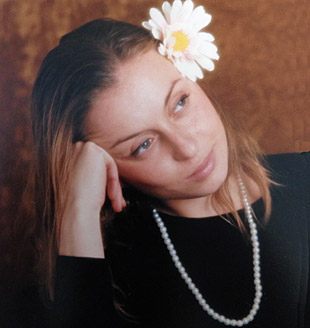
Nina Pekerman has been fighting the odds since she was born. She arrived on this planet as a weak, pre-term baby born in Moldova, a small country tucked between Romania and the Ukraine. Small but fierce, she grew into health in swimming – becoming a national record-setting 9-year-old. By the age of 16, she felt that anti-Semitism ingrained in Moldovan society was holding her back from her sporting ambitions, so she found a way to emigrate on her own to Israel. After serving as a combat fitness instructor in the Israeli Army, she switched from swimming to find some international cycling success before discovering triathlon.
After winning five national Olympic distance triathlon titles, Pekerman decided to switch to the Ironman distance in 2010 and found her greatest success. She won her first try at the distance in the 2010 edition of Israman, placing 5th overall including the men. She followed that with a 10th overall woman and 2nd in the 30-34 age group at Frankfurt and placed 26th overall woman and won a world title in the women’s 30-34 age group at the 2010 edition of the Ironman World Championship. She followed up with a 2nd-place in the women's 30-34 age group at Kona in 2011.
After turning pro last year, she took 10th at Ironman events in South Africa and Frankfurt and set a career PR of 9:43 at Ironman Arizona.
Bearing a passing resemblance to Emma Snowsill in terms of small build, quiet demeanor and fierce competitive fire, Nina has worked with her mental coach Efrat Avnor to erase self-imposed limits and create a belief that, at age 35, her best years are ahead.
This interview was conducted at the 2013 edition of Israman in Eilat, Israel with the help and translation of her partner in “A Bridge to Dreams,” Efrat Avnor.
Slowtwitch: Where were you born and how did you get introduced to sports?
Nina Pekerman: I was born in 1977 in Chisinau, Moldova. I was a pre-term baby and was sickly as a child. In order to improve my health I took up sports at age 9 and was in a swimming club until age 14 and then went to a sports boarding school.
ST: Tell us about your parents. Did they have sporting backgrounds?
Nina: My father Michael worked as a director of a transportation company and was trained in martial arts. My mother Raissa was also an athlete and worked in different jobs to help support the family, especially my older sister and me.
ST: How good were you in swimming growing up?
Nina: I was a champion swimmer and set some records. At the age of 9 I swam 29 seconds in the butterfly for 50 meters and 28 seconds for the 50 meters in freestyle. I set other age records in Romania and Moldova but also competed in other countries.
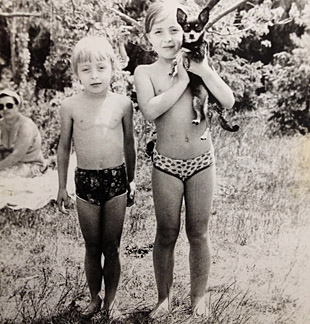
ST: So what led you to move to Israel?
Nina: My dream was to be accepted for who I was and to compete at the highest level for my country. But because of my name, the authorities and fellow athletes knew I was Jewish. It was kind of disappointing. I kept on trying to pursue international success with swimming, but it wasn't easy for me because I was suffering from anti-Semitism. So I decided I wanted to move to Israel.
ST: I see that you came alone – which was brave. Why was this necessary?
Nina: My parents had jobs and were raising my sister and were not in a position to leave. When I was 16 I decided to come to Israel. But it wasn't possible at first to emigrate because I needed to learn Hebrew and to become familiar with the history and the culture of the country. But there was a way. In 1994, at the age of 17, I was accepted in the NAALE, which is a program of the Jewish Agency for Israel which means Teenagers Emigrating Before Parents. They taught us Hebrew and took us on trips around Israel to experience the culture and know the country and get a sense of being a part of Israel. So in 1994 I moved to Israel and studied for two years in an agricultural high school in Kfar Silver.
ST: What did you hope to do as an Israeli citizen?
Nina: I dreamed of competing for Israel at the Olympics. I was optimistic because Israel does not carry a high sports profile and does not have many internationally ranked athletes.
ST: All Israeli citizens must serve a tour of duty in the Army when they turn 18. What happened with you?
Nina: I wanted to be a fully contributing citizen. Because I knew sport, I wanted to be a physical trainer for officers. At the time I was also working to support myself as a waiter and doing other small jobs and trying to send my family some money. At the time I joined the Israeli Army, I wore myself out. I was suffering from exhaustion. I could not find quiet and I could not sleep. Finally, I became unconscious for three days and found myself in a wheelchair getting medical treatment and rehab.
ST: You must have been shocked because you were an athlete and very physically fit?
Nina: What happened to me wasn’t an accident. I had simply worked myself into exhaustion. And I refused to accept the fact that I should not walk. So two weeks later I checked myself out of the hospital.
ST: Where did you stand at this point?
Nina: This meant a few things for me. One, knowing that Israel generally does not pursue sport to a high level and wanting to be something in Israeli sport, I felt I should become a fitness trainer and a swim coach. I wanted a sense of contributing to Israel, being a part of Israel – and to be someone who promotes sports. I also thought I could become involved in the rehabilitation because I knew how it felt to be injured and sick and what was required to come back to health and fitness. Eventually, in 1998, I studied physical fitness for disabled persons at the Wingate Institute.
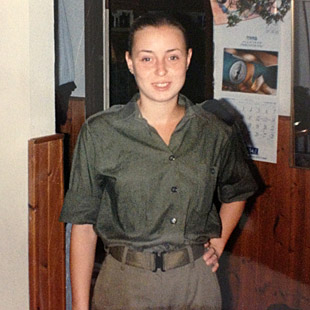
ST: You might have a good medical reason to leave the Army?
Nina: After the incident the Army wanted to release me. And I fought and didn’t let that happen. I volunteered for three months and came back as a combat fitness instructor at the highest level.
ST: If not for the illness, you might have been serving in combat situations?
Nina: When I was in the Army, women were not assigned combat or dangerous duty. But if there was conflict in my time I would definitely be a part of it. If it was combat I would be there.
ST: Some say that Israel is advanced in treating women equally as they all must serve in the Army and surely Golda Meir served as Israeli Prime Minister during the Six Days War in 1967. What is your experience of gender fairness in Israel?
Nina: There is no equality between the genders in Israel. In reality, still more men are in managerial and leadership positions and women need to fight much more to get into a position of leadership. This is one of the things that are very important for me. Which is why I always emphasize being 5th overall including the men at the Full Israman in 2010. Because to me strength and mental ability have nothing to do with gender. It’s where you are here (POINTS TO HER HEAD AND HEART) So this is why it is important to emphasize that everyone is equal. I will not treat someone different because they are a man or a woman. It is important for me that more women will join in sport and they will be more equal.
ST: Swimmers usually find they cannot improve sometime before the age of 21. So where did you go to pursue sport next?
Nina: When I realized I achieved everything I could in swimming, I turned to biking and won a road bike championship in Israel. In 2003, I placed 25th overall at the UCI ‘B’ World Championship 100 kilometer women’s road race [8 minutes 30 seconds back of winner Li Meifang of China]So after that, in 2004, I turned to triathlon.
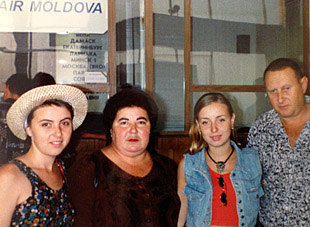
ST: There were big changes in your family life that year as well?
Nina: My parents joined me in Israel in 1999. In 2004 my father Michael died in a car accident and I returned from cycling in Europe to Israel to live with my mother. That same year I was offered a contract with an Italian professional team and my mother told me to chase my dream. But then two weeks afterwards, my mother found she was sick with cancer so I returned to Israel – but I didn’t have to give up my dream. I became a triathlete and won the Israel Championship at the Olympic distance from 2004 through 2007. I also won the Maccabiah Games Triathlon in 2005. After taking a year off, I won the Israel Championship again in 2009. All those championships were held here in Eilat.
ST: I see from you results that you raced international events on the ITU circuit. You were 4th at the 2005 and 2006 Eilat ITU Triathlon European Premium Cup, but you had disappointing results at the major European ITU races – posting 19th at the 2007 Alanya Premium European Cup and DNFs at the 2006 Madrid World Cup and the 2007 Mooloolaba World Cup. What finally led you to the longer distances?
Nina: I tried to compete against athletes with the highest level of achievements. That competition was not available in Israel. I had great hopes to do well in Mooloolaba in 2007, but the triathlete I was working with on the bike stopped her race and I lost the peloton and was left behind in the winds. After five years racing the Olympic distance, I came to understand that I would always be alone and would not have a professional team with me, so I turned to Ironman distance triathlon.
ST: You have had a much higher level of success in long distance triathlon. Take me through your transition to the long course?
Nina: In 2009 I started training for long distance and at first I thought the distances taken together were a bit terrifying but I persisted and things started to come together. I started competing for the first time in 2010 and my first full Ironman distance race was Israman. I won the women’s title and was 5th overall including the men in 10:34. And most important, I fell in love with this form of the sport.
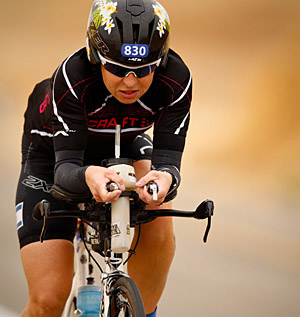
ST: How proud were you?
Nina: Huge! Infinite! Ironman was a whole new world, a different sport. I felt that this was the place for me. Actually it brought out all my potential out and my ability to work mentally. It brings everything altogether — body, mind and soul.
ST: Is any formal religion a part of your belief system?
Nina: I respect a person being a person – trying to be the best person they can be – and being moral. I believe in God but it doesn’t matter to me what religion at all.
ST: How did your long course career progress after your win at Israman? I see you made quite a splash at Ironman Frankfurt in 2010?
Nina: I was 10th overall woman and second in my 30-34 age group at Frankfurt [in a time of 9:47:25. She was 43 minutes back of winner Sandra Wallenhorst and ahead of veterans Nicole Leder and Lucy Gossage]. At Kona I was 26th overall woman and first in my 30-34 age group [in a time of 9:55:19, just behind Bree Wee and Carrie Lester and just ahead of Silvia Felt and Tereza Macel] In 2011, I was 20th overall women and 2nd in the 30-34 age group at Kona [in a time of 9:45:35, just behind Mary Beth Ellis, Linsey Corbin and Samantha Warriner.] I am the only professional Ironman that we have in Israel.
ST: What have you done since you turned pro in 2o12? Looks like you had a very full menu of Ironman races.
Nina: I was 10th overall woman last year at Ironman South Africa and 20th at Ironman Austria 70.3 in 4:57 and 10th at Ironman Frankfurt. At the U.S. Championship Ironman in New York City I got worn down on the run and was 13th overall woman. After missing Kona, I was 12th at Ironman Arizona in a PR of 9:43:50. Now I am saving myself for the Asia-Pacific Championship at Ironman Melbourne in two months, so I did the Half Israman and won the overall women’s title [in 5:43:44, 9th overall including the men and 31 minutes behind the overall men’s winner].
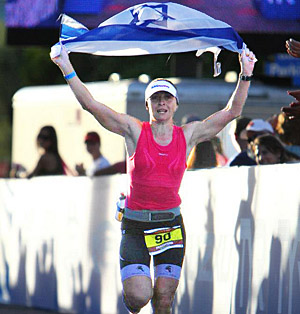
ST: Are you inspired by the beauty of the Israman course?
Nina: I like it when it is tough and hard because then you can bring the best of yourself. I also like the routes to be challenging and to be tough because then you bring everything from yourself and prove to yourself your potential and your ability. I think the Israman course is one of the most beautiful. I have done 9 Ironman races around the world so I know this is one of the most difficult and whoever wants a real challenge should come here.
ST: How do you think it compares to legendary tough Ironman-distance course like Norseman, Gerardmer and Lanzarote?
Nina: I heard about the French course and I know it is hard. But I think that the difficulty must be measured not only in terms of the climbing on the bike, but also the weather, the dryness, and the winds here are very, very tough. Also, after the riding at Israman, you have a very, very tough 10 kilometers of downhill running that hurts very much and makes it tough to run the last 11 kilometers on the flat.
ST: What is your long term goal?
Nina: I want to go to the Ironman World Championship again and improve my place and get a better time. Of course to reach Kona is never promised. No Ironman is a sure thing. To finish is never obvious. But I want to finish better than 20th. Once I qualify for Kona on a professional basis, I will probably aim higher.
ST: And in life?
Nina: I want people to take discipline and all the things that sports represents – like persistence and willpower – to raise it up and to use it in life through sport. I want to take all this information all this experience I have in Ironman and sports for 17 years and use it to establish a school all over Israel and, if it is good, take it perhaps outside Israel. I am working with my mental coach and partner Efrat Avnor to build this business we call “A Bridge To Dream” to give lectures and seminars and life coaching to help bring other people to their potential. Efrat brings her skills in the mental approach and I will bring my knowledge of the discipline, willpower and the techniques of effective sports training. We will show people how to compete, but remind them that success does not come at anyone else’s expense. And it will be aimed at getting people to appreciate life – and to have fun doing it.
ST: Who are your sponsors?
Nina: I am a professional but I am not sponsored in Israel. So this year I have two major sponsors that support me – Craft clothing and Cannondale bicycles. Also, the business I have with my partner Efrat Avnor, “A Bridge to Dream,” is sponsoring our activities for training and travel costs for racing.


